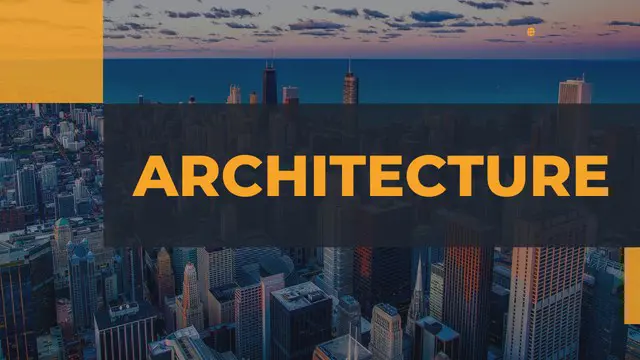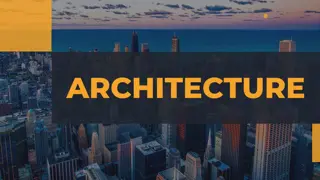
Architectural Studies: Architecture & Construction Design Management (CDM)
CPD Certified| Free PDF Certificate | Lifetime Access | Learner Support | No Hidden Fees | 100% Success Rate
EDURISE
Summary
- Certificate of completion - Free
- Reed courses certificate of completion - Free
- Tutor is available to students
Add to basket or enquire
Overview
Unlock Your Architectural Potential with Our Comprehensive Architecture Diploma!
Are you passionate about the world of architecture and design? Do you dream of creating structures that leave a lasting impact on the landscape? Our Architecture Diploma is your key to unlocking a world of possibilities in this dynamic field.
Why Choose Our Architecture Diploma Course?
In-Demand Skills: The demand for skilled architects is on the rise. Our course equips you with the knowledge and expertise needed to excel in this industry.
Comprehensive Curriculum: Our curriculum covers a wide range of architectural topics, from design principles and building materials to sustainable architecture and urban planning.
Flexible Learning: We understand the importance of flexibility in your busy life. That's why our course is designed to fit your schedule, allowing you to study at your own pace.
Expert Instruction: Learn from industry experts who have a wealth of knowledge and experience to share. Gain insights from professionals who are actively shaping the world of architecture.
Career Advancement: Whether you're just starting your career or looking to take it to the next level, our Architecture Diploma can open doors to exciting opportunities in the field.
Course Highlights:
Architectural Design: Learn the art and science of designing functional and aesthetically pleasing structures.
Sustainable Architecture: Discover how to create environmentally friendly and energy-efficient buildings.
Urban Planning: Dive into the complexities of designing cities and communities for the future.
Building Materials: Explore the wide range of materials used in construction and their applications.
Architectural History: Gain insights into the rich history of architecture and its influence on modern design.
Project Management: Master the skills needed to manage architectural projects from concept to completion.
Who Should Enroll?
Individuals with a passion for architecture and design.
Professionals seeking to enhance their architectural knowledge and skills.
Students interested in pursuing a career in architecture.
Those looking to explore the world of urban planning and sustainable design.
Don't miss out on the opportunity to elevate your architectural expertise. Enroll in our Architecture Diploma course today and take the first step towards a rewarding career in this exciting field. Join us and start shaping the future of architecture!
Free Gift with Architecture Training
- Architecture Course Completion PDF Certificate
- Tutor Support
- Yearly Free Webinar on Architecture
Curriculum
Course media
Description
Learning Outcomes for Architectural Studies Curriculum:
1. Comprehensive Understanding of Architectural History
- Gain in-depth knowledge of architectural history, from ancient civilizations to contemporary movements.
- Analyze the evolution of architectural styles, concepts, and influential figures throughout history.
2. Recognition and Appreciation of Architectural Styles
- Identify and differentiate various architectural styles, including their key characteristics and defining elements.
- Develop an appreciation for the aesthetic and cultural significance of different architectural movements.
3. Mastery of Architectural Concepts and Movements
- Explore the foundational principles and concepts that underlie architectural design.
- Understand the key ideas and philosophies behind architectural movements that have shaped the built environment.
4. Expertise in Art Deco Architecture
- Gain specialized knowledge of the Art Deco architectural style, its origins, and its prominence during the 20th century.
- Analyze iconic Art Deco buildings and their unique design features.
5. Proficiency in Modern and Postmodern Architecture
- Study the evolution from modern to postmodern architecture, including notable architects and iconic structures.
- Evaluate the characteristics, innovations, and influences of both architectural styles.
Module Descriptions:
Introduction to Architectural Studies: Embark on a fascinating journey into the world of architecture. Explore the fundamental principles of architectural studies, including key terminology, concepts, and the significance of architecture in society.
Ancient Architecture: Step back in time to explore the architectural wonders of ancient civilizations. Study the monumental structures, innovative engineering, and cultural contexts that define ancient architecture.
Architectural Concepts and Movements: Delve into the foundational concepts and philosophical underpinnings of architectural design. Examine how architectural movements have been shaped by cultural, social, and technological forces.
Architectural Styles: Investigate a wide range of architectural styles, from classical to contemporary. Learn to identify and appreciate the distinctive features and design elements of each style.
Art Deco Architectural Style: Focus on the Art Deco architectural style that flourished during the early 20th century. Explore its geometric forms, decorative motifs, and the impact of Art Deco on urban landscapes.
Modern and Postmodern Architectural Style: Study the dynamic transition from modernism to postmodernism in architecture. Analyze the principles, characteristics, and influential architects of both styles, and understand their impact on architectural thought and practice.
Certificate of Completion
After completing the Architecture diploma course, you will be able to obtain your free PDF certificate of course completion.
Who is this course for?
Ideal Audience for the Architectural Studies Course:
Architecture Enthusiasts: Individuals with a passion for architecture and a keen interest in understanding its history, styles, and evolution.
Art and History Students: Students pursuing degrees in art, history, or related fields who want to broaden their knowledge of architectural history and its cultural significance.
Design and Urban Planning Professionals: Designers, urban planners, and professionals in the built environment seeking a deeper understanding of architectural styles and concepts.
Cultural and Heritage Preservationists: Those involved in cultural heritage preservation who want to learn about ancient architecture and its conservation.
Art and Design Educators: Educators looking to enrich their curriculum with architectural content and insights.
Tour Guides and Historians: Tour guides and historians interested in expanding their expertise to include architectural history and its impact on cities and landscapes.
Art and Architecture Collectors: Collectors and enthusiasts of architectural art and artifacts who want to understand the context and history behind their acquisitions.
General Knowledge Seekers: Anyone curious about architecture and its role in shaping the world we live in, regardless of their professional background.
This course caters to a diverse audience interested in gaining a comprehensive understanding of architecture, from its ancient roots to the influential styles of the 20th century. It is suitable for both individuals with prior knowledge of architecture and those approaching the subject for the first time.
Requirements
The Architecture course has no formal entry requirements.
Career path
- Architectural Assistant: Entry-level position, often earning £20,000 - £30,000 per year in the UK.
- Chartered Architect: After qualification and experience, salaries can range from £35,000 - £60,000 per year.
- Senior Architect or Principal: Experienced architects in leadership roles can earn £70,000 - £100,000 or more annually in the UK, depending on responsibilities and location.
Questions and answers
Currently there are no Q&As for this course. Be the first to ask a question.
Certificates
Certificate of completion
Digital certificate - Included
Reed courses certificate of completion
Digital certificate - Included
Will be downloadable when all lectures have been completed
Reviews
Currently there are no reviews for this course. Be the first to leave a review.
Legal information
This course is advertised on reed.co.uk by the Course Provider, whose terms and conditions apply. Purchases are made directly from the Course Provider, and as such, content and materials are supplied by the Course Provider directly. Reed is acting as agent and not reseller in relation to this course. Reed's only responsibility is to facilitate your payment for the course. It is your responsibility to review and agree to the Course Provider's terms and conditions and satisfy yourself as to the suitability of the course you intend to purchase. Reed will not have any responsibility for the content of the course and/or associated materials.


